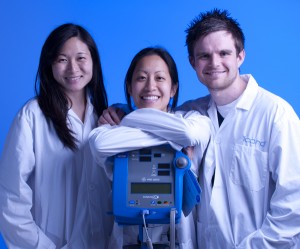CIHR-funded spinal cord researcher Dr. Andrei Krassioukov is taking a team to this year’s Paralympic Games in London, but instead of competing in sporting events, the ICORD scientists will be conducting research and providing wheelchair athletes with crucial information about cardiovascular health during training and competition.
With core funding from the Craig H. Neilsen Foundation, Dr. Krassioukov and his 5-member team will operate a cardiovascular health clinic in London’s Olympic Village from August 29th to September 9th. One area the research team will investigate is autonomic dysreflexia, in which Dr. Krassioukov is a world expert. Autonomic dysreflexia is a drastic increase in blood pressure striking people with cervical and upper thoracic spinal cord injuries (SCI). If left untreated, it can lead to bleeding in the brain and or death.
This unstable blood pressure control is a concern to the general SCI population, but especially to athletes with SCI. Dr Krassioukov believes there needs to be much greater awareness of this issue. “With Paralympic athletes, we have two problems in this area,” says Krassioukov. “One is those who don’t know this is a risk and need crucial, practical information. The other is athletes who are aware of autonomic blood pressure spikes and will actually attempt to use it as a competitive advantage, which is extremely risky.”
The purpose of the clinic in London is twofold: it will allow Dr. Krassioukov and his team to provide evidence-based clinical knowledge and crucial practical information on unstable arterial blood pressure control among athletes with SCI to Paralympians and their coaches at the 2012 Summer Games, and continue the research in this area that they started at the 2010 Winter Games in Vancouver.
The clinic expects to see 60 wheelchair athletes during the games–40 with traumatic SCI, and 20 without. They will be providing information on three cardiovascular conditions common among athletes with SCI: autonomic dysreflexia, boosting (intentionally inducing autonomic dysreflexia to improve athletic performance) and orthostatic hypotension (drops in blood pressure that occur when transiting from lying down to sitting up, which can cause dizziness, or fainting).
The team will also perform various heart rate and blood pressure tests to investigate the presence and severity of autonomic nervous system dysfunction in wheelchair athletes. As autonomic dysfunction is unique to persons with SCI, it is possible that these athletes are at a disadvantage when competing against athletes with similar motor function but no SCI.
Earlier this year, Dr. Krassioukov was awarded a $1.9 million Team Grant by CIHR to study cardiovascular health, including autonomic dysreflexia, in people with SCI.
An article about Dr. Krassioukov’s research into boosting appeared in the Txchnologist blog on August 2nd, 2012.
Dr. Krassioukov was interviewed for this story about boosting in the Mail Online on August 23rd, 2012.


